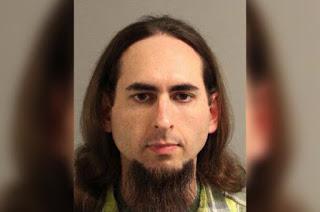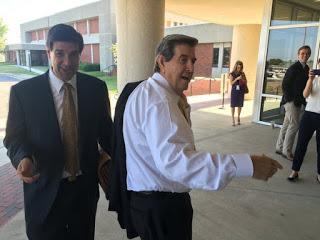
Jarrod W. Ramos
In the wake of the recent deadly shooting at the Capital Gazette newspaper in Annapolis, Maryland, several commentators have suggested it might usher in an era of attacks on the free press. If those commentators had been able to walk in my shoes over the past 10 years, they would know such an era already is under way -- especially in Jeff Sessions' Alabama.Sessions and/or his acolytes have relentlessly attacked this blog since 2008, when I was cheated out of my job at UAB for reporting on the Don Siegelman case in a way that then Gov. Bob Riley (and his son, Rob "Uday" Riley, and Rob's legal partner, current U.S. Sen. Doug Jones) found displeasing.
The attacks became so flagrant that they included my kidnapping, from inside my Birmingham home without a warrant and no allegation of a crime, and a five-month incarceration (from Oct. 2013 to March 2014) in the Shelby County Jail -- making me the first U.S. journalist to be incarcerated since 2006, the only imprisoned journalist in the western hemisphere for 2013, and apparently the only journalist in U.S. history to be jailed due to an unlawful preliminary injunction in a defamation case. In other words, Alabama in the Sessions era became more of a First Amendment backwater than places like Venezuela, Chile, and El Salvador.
No one should be surprised that Sessions, in his role as Trump attorney general, has not ruled out jailing journalists in the future.
The actions of shooter Jarrod W. Ramos in Annapolis were dreadful, but they did not start a movement that had not already been going on for a while. In fact, there are a number of parallels between the Ramos case and the attacks we've experienced at Legal Schnauzer. Let's take a look:
(1) Facebook as a platform for harassment -- The Ramos story started when he connected with a former high-school classmate, a woman, on Facebook. At first, the woman tried to be friendly and helpful when Ramos noted that he was struggling with some issues in his life. But she sensed something was amiss and tried to withdraw from the conversation, sparking threats, harassment, and stalking from Ramos. She pursued criminal charges, and Ramos was found guilty, with coverage of that case sparking his crusade against the Capital Gazette. Trolls of some nature -- from Alabama, Missouri, Russia, parts unknown -- have been attacking my Facebook account for months -- causing URLs to Legal Schnauzer to be blocked for anywhere from 30 days to a few hours. It's happened at least a dozen times since the first of this year.
(2) Baseless defamation claims as a mechanism to silence reporters -- Ramos brought a defamation lawsuit against the Capital Gazette (CG) that was almost laughably weak. Acting as his own lawyer (pro se), Ramos could not point to a single item in the CG's story that was false. It's hard to support a defamation claim when you admit the story in question is accurate. Ramos also seemed unaware that journalists are legally privileged to report on official and public proceedings, such as a court case. Ramos' lawsuit was no weaker than the sham defamation claim Rob Riley brought against Legal Schnauzer and me (even my wife, Carol, who had nothing to do with the blog until after I was thrown in jail) over my reporting on his "friendship" with lobbyist Liberty Duke. How irregular was the Riley lawsuit, which led to me being thrown in jail for "contempt" over a temporary restraining order (TRO) and preliminary injunction that have been prohibited under more than 230 years of First Amendment law?

Rob and Bob Riley
a. Riley and Duke (the plaintiffs) never sought discovery to prove their case. (Maybe that's because they had no case.) Riley never has stated under oath that my reporting was false; Duke filed an affidavit making such a claim, but why didn't Riley follow suit? Did he and his colleagues think it was OK for her, a non-lawyer, to lie under oath, while such an act might put his bar card at risk?b. Riley and Duke never asked for a trial or a jury, both of which have been required under decades of defamation law. Instead, they asked corrupt retired judge Claud Neilson (a Bill Baxley crony) to unlawfully act as a one-man censor.
c. As a matter of law, my reporting on the Riley/Duke relationship never has been found false or defamatory.
d. I never was hit with any money damages in the case, and Riley/Duke never made any valid request for such damages. They did ask for "sanctions" against me, but those are prohibited under Alabama law against a non-attorney representing himself -- as I was.
(3) Murder vs. kidnapping -- Thankfully, I was not murdered like the five CG employees that Ramos shot. But evidence suggests that one reason for suing Carol was to incarcerate both of us and possibly kill both of us -- with no one likely ever knowing what happened to us. Aside from that, I clearly was the victim of a state-sanctioned kidnapping. Officer Chris Blevins showed no warrant on the scene, never said he had a warrant before entering our home, never stated his reasons for being on our property (a violation of Alabama law), and could not produce a warrant when a judge ordered him (and prosecutors) to do so at my trial for "resisting arrest." Aside from the warrant issue, the U.S. Supreme Court has made it clear that it is unlawful for a law-enforcement officer to enter a residence without a warrant for a "routine felony arrest." (See Payton v. New York, 455 U.S. 573, 1980.) My case involved no felony, no allegation of a crime at all -- and yet, cops broke into our home, which they clearly cannot do under law that has been around for more than 30 years.
(4) Attacking employment as an act of terror -- The victim of Ramos' harassment lost her job at a bank, under peculiar circumstances, not long after her Facebook interactions with him turned dark. She has stated that she believes Ramos contacted her employer and caused her to be terminated. There is zero doubt that Rob Riley, or someone affiliated with him, caused me to be cheated out of my job at UAB -- where I had worked for 20 years -- because of my reporting on the Siegelman case. Evidence also strongly suggests that Riley and legal buddy Doug Jones were alarmed about my reporting on a federal HealthSouth lawsuit, which wound up generating more than $51 million in attorney fees, with several million of that going to Riley and Jones. In fact, it has been reported that funds from that lawsuit largely helped finance Jones' run for the U.S. Senate seat vacated by Jeff Sessions.
